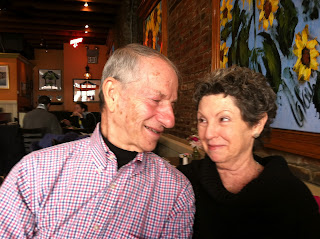Minutes were likely taken off my (hopefully) long life last night. My husband and I were meeting friends for dinner at Rose Tattoo in the Fairmount section of Philadelphia. He drops me off near the restaurant, and as I’m about to walk in, someone pulls out of a parking spot. I stand in it and call hubby, telling him to circle back fast. Then a guy in a black BMW starts edging into the spot I’m claiming. I wave him off, but he keeps coming. ‘My husband’s just around the corner,” I say, holding my ground.
“I’m calling the cops,” he replies.
And he does.
Just then my husband shows up and decides not to get into the middle of it. (I’m snapping a photo of BMW's license plate –but it didn’t come out cause I accidentally had “video” on; BMW’s snapping a photo of me.).
With my husband having pulled away, there's no point any longer. So, I step out of the space and walk into the restaurant. "I hope you don't serve that guy," I tell the hostess.
A drink or so later, I’ve calmed down. And after a great meal, it's almost forgotten. But as we leave, the hostess says:
“The guy came in with the cops. They were asking for you. I told them I didn’t know where you were. The cops said, ‘Let’s get out of here.’”
A search on the internet shows that this kind of thing happens all the time. In last winter’s heavy snow, Mayor Nutter said people should respect the lawn chair holding the spot a homeowner dug out, though technically it’s a free-for-all, it appears.
But if I was there first, why isn't it my spot? Do I need to be sitting inside of a ton of steel?
Anyone know the law in PA? I couldn’t find it. Aside from that, what would you do?
On line there are dozens of comments from angry motorists and equally angry pedestrian place-holders. Here's my favorite:
“The spot goes to who wants it the most. The person standing there while a vehicle edges ever so close to their knees or the driver willing to run over the parking squatter.”
There are lots of ways to be "unretiring."
Your thoughts?










